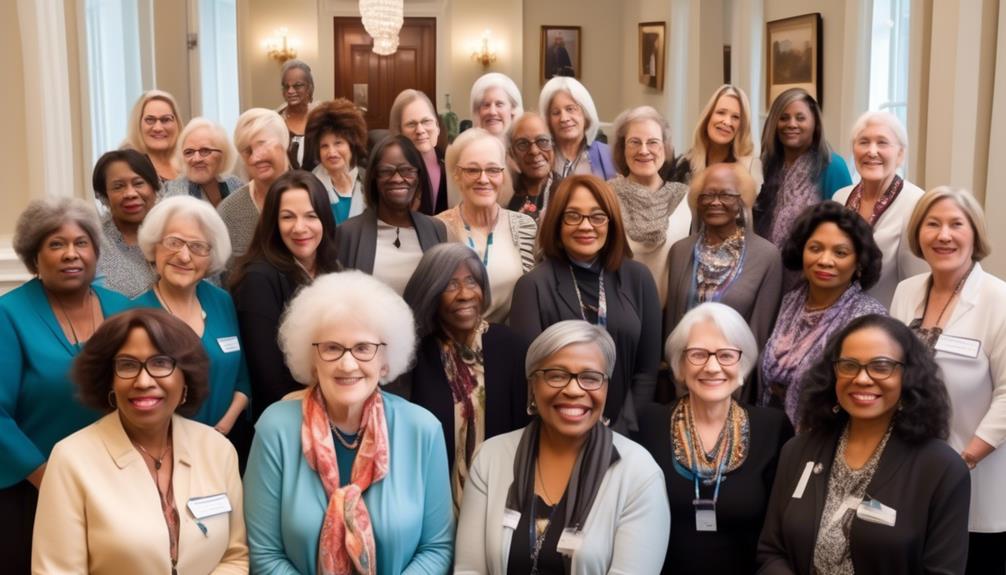With the challenging job of addressing the caregiver shortage in the United States, it is essential that we confront this major issue directly. As the burden on family caregivers keeps increasing, the effect on our healthcare system and society as a whole is becoming increasingly clear.
However, amidst this crisis lies a glimmer of hope – a chance to explore innovative solutions and cultivate meaningful change. Join us as we unravel the layers of this pressing matter and uncover potential paths towards a more sustainable and supportive future for caregivers and those in their care.
Key Takeaways
- Family caregivers face health risks from caregiving strain.
- Demand for caregivers rises with the aging population.
- Shortage of direct care workers worsens caregiver burden.
- Public awareness crucial for supporting caregivers and improving conditions.
Understanding the Caregiver Crisis
As caregivers ourselves, we empathize with the challenges faced by millions of family members across America who selflessly provide over $650 billion worth of unpaid care annually. The weight of caregiving responsibilities can take a toll on one's health, with 63% of family caregivers experiencing serious illnesses due to the physical and emotional strain.
The shortage of direct care workers further complicates the situation, leaving family caregivers with added pressures and impacting the quality of care they can provide to their loved ones. With the aging population in America on the rise, the demand for caregivers continues to grow, highlighting the urgent need for support and resources.
Additionally, the expanding responsibilities under Medicare Advantage programs are placing additional stress on family caregivers, making it essential to address the caregiver crisis comprehensively. Understanding the intricate web of challenges faced by caregivers is crucial in developing effective solutions and providing the necessary support to ensure the well-being of both caregivers and those under their care.
Statistics That Demand Attention

The compelling statistics on caregiving in America underscore the urgent need for attention and action to address the caregiver crisis. The numbers paint a stark picture of the challenges faced by family caregivers and direct care workers:
- Over $650 billion worth of unpaid care is provided annually by family caregivers in America, highlighting the immense contribution they make to society without financial compensation.
- 63% of family caregivers develop serious illnesses due to the demands of caregiving, shedding light on the toll it takes on their own health and well-being.
- The aging population in America is growing rapidly, increasing the demand for caregivers, while direct care workers are leaving the industry due to low pay, exacerbating the caregiver shortage.
These statistics reveal the pressing need for solutions to support caregivers, improve working conditions for direct care workers, and ensure the well-being of both those receiving care and those providing it. The challenges are significant, but with awareness and collective action, we can work towards a more sustainable and supportive caregiving system.
The Urgency of Public Awareness
Recognizing the growing demand for caregivers and the critical need for support, our collective efforts must now focus on amplifying public awareness of the caregiver crisis in America. As the number of individuals in need of care continues to rise, it's imperative that we highlight the challenges faced by family caregivers and direct care workers.
With an estimated 150 million people requiring caregiving within the next two years and 10,000 individuals turning 65 daily, the demand for caregivers is rapidly intensifying.
The urgency of public awareness is underscored by the fact that many direct care workers are leaving the industry due to low pay and long hours, further exacerbating the caregiver crisis. This shortage may lead to seniors being unable to remain in their homes, emphasizing the critical need for action.
The proposed Caregiver Relief Act, aimed at alleviating the burden on family caregivers, hinges on widespread awareness for its success. By raising public awareness, we can pave the way for meaningful solutions to support both caregivers and seniors in need.
The White House Office of Aging Conference

Gathering policymakers, caregivers, and advocacy groups, we unite at the White House Office of Aging Conference to address the caregiver crisis in America through impactful policy discussions and advocacy initiatives. This vital gathering aims to support family caregivers and direct care workers who tirelessly provide essential care for aging populations.
The conference serves as a platform for:
- Highlighting Challenges: By shedding light on the difficulties faced by family caregivers and direct care workers, we aim to raise awareness about the critical need for support and resources in this sector.
- Advocating for Legislative Action: Through engaging in policy discussions and advocacy efforts, we strive to push for legislative measures that will provide financial support and resources to alleviate the burden on caregivers.
- Driving Awareness and Change: By convening experts and stakeholders, we work towards fostering a deeper understanding of the challenges faced by caregivers and advocating for impactful policy changes to better support caregivers nationwide.
Solutions for Alleviating Caregiver Burden
In our quest to address the challenges faced by family caregivers and direct care workers, we prioritize the implementation of effective solutions for alleviating caregiver burden. One crucial step towards supporting family caregivers and acknowledging the significant contributions they make is ensuring access to affordable respite care. Respite care plays a vital role in preventing caregiver burnout, maintaining their well-being, and ultimately improving the quality of care provided to their loved ones.
To alleviate the financial, physical, and emotional strain experienced by caregivers, comprehensive policies that address the lack of affordable respite care must be put in place. The introduction of the Caregiver Relief Act, providing regular respite care benefits, could be a legislative move that potentially eases the burden on family caregivers. These unsung heroes, who often sacrifice their own well-being for others, deserve the support and recognition that affordable respite care can offer.
Frequently Asked Questions
What Is the Most Difficult Thing in a Caregiver Job?
The most challenging aspect of being a caregiver is the emotional toll it takes on us. Watching a loved one's health decline and meeting their needs can be overwhelming.
Juggling caregiving with personal and work life adds to the stress. Managing difficult behaviors and health conditions, along with financial strain and complex healthcare systems, can be daunting.
The lack of support and resources often leads to burnout and exhaustion. It's a tough but rewarding role.
What Do Caregivers Need Most?
What caregivers need most is support. Caregiving can be overwhelming, so having a strong support system in place is crucial.
Whether it's financial assistance, access to respite care, emotional validation, or just someone to lend a listening ear, support comes in various forms and can make a significant difference in a caregiver's well-being.
What Is the Family Caregiver Alliance in Texas?
We're the Family Caregiver Alliance in Texas, a nonprofit organization dedicated to supporting family caregivers.
We provide educational resources, training, and advocacy to help caregivers navigate their roles effectively.
Our support groups, workshops, and online tools address the needs of caregivers in Texas, aiming to alleviate stress, promote self-care, and enhance the quality of life for both caregivers and care recipients.
Through partnerships and community engagement, we raise awareness and provide valuable support to those in caregiving roles.
Can a Family Member Get Paid to Be a Caregiver in Tn?
Yes, in Tennessee, family members can indeed get paid to be caregivers through the state's Medicaid program, TennCare CHOICES. This financial assistance provides vital support to eligible individuals in need of long-term care.
The payment amount varies based on the care level required and services rendered. This opportunity not only eases financial burdens but also ensures quality care for loved ones.
It's a meaningful way to support both caregivers and care recipients.
Conclusion
As we navigate the caregiver crisis in America, let's remember the strength and resilience of those who selflessly care for their loved ones.
Like a beacon of hope in a storm, our collective efforts to raise awareness and seek solutions will light the path towards a brighter future for caregivers and care recipients alike.
Together, we can provide the support and recognition they deserve, creating a community of compassion and understanding.









